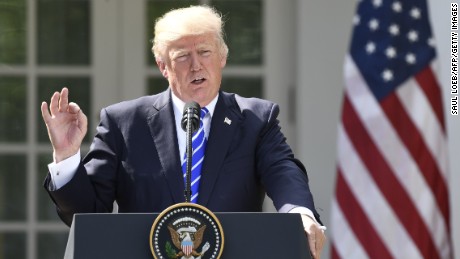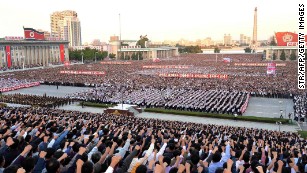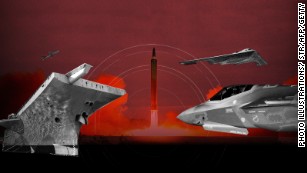Trump warns of 'devastating' military option as North Korea moves jets
Washington (CNN)US President Donald Trump issued a familiar warning to North Korea on Tuesday, saying the US is prepared to use "devastating" military action if necessary -- as two defense officials tell CNN that the rogue nation has moved a small number of fighter jets, external fuel tanks and air-to-air missiles to a base on its eastern coast to boost military readiness.
The officials would not go beyond saying a small number of assets had been moved by the regime to a known airfield in the eastern part of the country.
The move was seen in US satellite imagery and is viewed by the US as a North Korean effort to boost its military readiness in the eastern sector. It would give the aircraft an ability to fly eastward further than its estimated 900-mile range.
North Korea accuses Trump of declaring war
Imagery so far has observed Mig-29 aircraft at the site. Some missiles and fuel tanks are on the planes, but for now, no single jet is carrying both the external fuel tanks and the missiles.
On Monday, the North Korean Foreign Minister Ri Yong Ho claimed US President Donald Trump had "declared a war" on his country, and threatened to shoot down US aircraft flying off its coastline even if they were in international airspace.
The United States flew B-1B bombers from Guam in international airspace to the east of North Korea on Saturday, according to US defense officials, in response to Pyongyang's "reckless behavior."
Officials said it was the furthest north of the Demilitarized Zone (DMZ) US bombers had flown in the 21st Century.
Both defense officials said that the US maintains sufficient aerial surveillance and radar capability in the region to know if any military aircraft take off from North Korea.
The military and North Korea: What you hear and what it means
Speaking alongside Spanish Prime Minister Mariano Rajoy, Trump reiterated that the US is "totally prepared" if they have to use the military option, saying military action in North Korea would be "devastating."
"If we take that option it will be devastating -- devastating -- for North Korea," Trump said in the Rose Garden during a news conference. "It's called the military option."
"He's acting very badly," Trump said of North Korea's leader Kim Jong Un. "He's saying things that should never ever be said."
Trump said the US was responding to Kim's provocations, but insisted his replies were merely in response to rhetoric from Pyongyang. He also decried the situation there, saying he was left a "mess" by previous administrations.
"I'll fix the mess," Trump said. "We'll see what happens."
US: We're not at war with North Korea
Both the United States and North Korea have been exchanging increasingly fierce rhetoric throughout the past week, against the background of the United Nations General Assembly in New York.
Threats of war from North Korea's top diplomat came in response to a provocative tweet sent by President Trump on Sunday, in which he said the rogue state "won't be around much longer."
"In light of the declaration of war by Trump, all options will be on the operating table of the Supreme leadership of DPRK," Ri said, using the official name for North Korea, according to his official English translator.
The Trump White House quickly dismissed the idea that war had been declared, with Press Secretary Sarah Sanders saying Monday the idea was "absurd."
Could North Korean, US threats of destruction cause an accidental war?
But despite the war of words, there has been no outward moves from either countries indicating preparation for an actual conflict.
"North Korea is strongly pushing their soldiers in the DMZ to report first and then take measures," South Korean Liberty Korea Party lawmaker Lee Cheol-woo said, quoting intelligence services.
"North Korea is being quite careful so that there is no accidental clash."
Lee said North Korea had taken no immediate action following the US's weekend flyover and possibly had not even been aware of it.
"I heard that the US disclosed its flight route because they thought North Korea appeared to be unaware of it ... their radar probably did not detect strong signals," he said.
CNN's Ben Westcott contributed to this report.
News Courtesy: www.cnn.com













